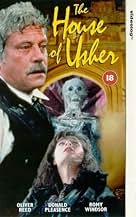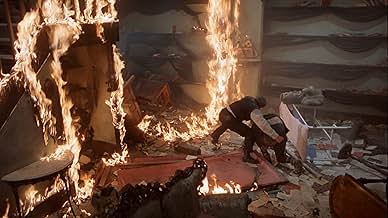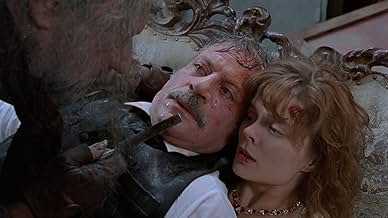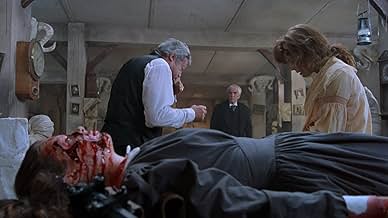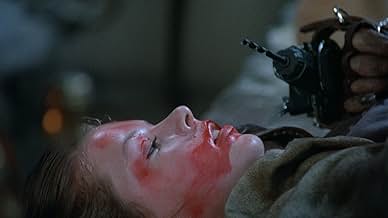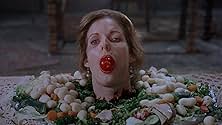Füge eine Handlung in deiner Sprache hinzuAn engaged couple going to the man's uncle's house get into a car accident. The woman becomes trapped in the house with deranged residents and weird happenings.An engaged couple going to the man's uncle's house get into a car accident. The woman becomes trapped in the house with deranged residents and weird happenings.An engaged couple going to the man's uncle's house get into a car accident. The woman becomes trapped in the house with deranged residents and weird happenings.
- Regie
- Drehbuch
- Hauptbesetzung
Empfohlene Bewertungen
Harry ALan Towers' produced this, another remake of Poe's classic tale. Oliver Reed does a lot of whispering and Donald Pleasence runs around a lot with his chainsaw. Not really a very good film but worth a look for it's two stars, who are again lumbered with a none too bright script.The youngsters Rufus Swart and Romy Windsor are positively dire, but scenes like a hungry rat being placed on a man's privates are quite fun to watch.
Soon-to-be-wed American couple Ryan (Rufus Swart) and Molly (Romy Windsor) travel to England to meet Ryan's uncle Roderick (Oliver Reed) at the family mansion, which is slowly sinking into a swamp. Whilst driving to the estate, the couple are shocked to see two ghostly kids standing in the middle of the road, and crash their car into a tree. Ryan is knocked unconscious, so Molly runs to the Usher home for help; convinced that an ambulance has been called for her injured fiancé, Molly rests, but ultimately finds herself a prisoner of Roderick, who wants the girl for himself, to carry his seed and continue his lineage.
Fancying himself as a bit of a Roger Corman, director Alan Birkinshaw tackled two Edgar Allen Poe adaptations in 1989, The Masque of the Red Death (which I have yet to see, but has a lousy rating), and what has to be the worst film ever to be inspired by The Fall of the House of Usher. Not only does the plot bear little resemblance to Poe's original story, but Birkinshaw's handling of the film is lousy, the director commanding hilariously bad performances from Oliver Reed and Donald Pleasence (both slumming it at this point in their careers), and staging the whole mess in some of the cruddiest movie sets imaginable: not just hideous to look at (garish paintwork, amateurish murals, ugly statues) but quite obviously fake, with flimsy plywood and polystyrene constructions masquerading as stonework and marble.
The movie makes no sense whatsoever, so much so that Birkinshaw wraps up matters with one of those cyclical, 'it was all a dream' endings that excuses the script's many flaws by closing the story as it began: with the soon-to-be-wed Ryan and Molly driving to the home of Roderick Usher. The fact that none of what we have seen has really happened means that no explanation is necessary for the two ghostly children that periodically appear, or for the extreme loyalty of the Usher's staff and family doctor, or for why Roderick's supposedly wheelchair-bound lunatic brother Walter (Pleasence) remains a prisoner when he can actually walk and there are numerous passages and secret doors by which he could leave.
Of course, films this bad can also prove to be quite entertaining, and the last twenty minutes are a riot: Pleasence goes kill crazy, hacking off the head of housekeeper Mrs. Derrick (Anne Stradi) and mutilating mute maid Gwen (Carole Farquhar) with his wrist mounted drill, and Reed drops all pretence of being a serious actor and gives one of the craziest performances of his career, which is saying something. The finale sees Reed and Pleasence having a scrap (which is worth the price of admission alone), during which a fire starts, all that plywood and polystyrene going up a treat.
4/10 - It's an interior decorator's nightmare, a film to set Poe spinning in his grave, and an insult to the viewer's intelligence, but I couldn't help but like it just a bit.
Fancying himself as a bit of a Roger Corman, director Alan Birkinshaw tackled two Edgar Allen Poe adaptations in 1989, The Masque of the Red Death (which I have yet to see, but has a lousy rating), and what has to be the worst film ever to be inspired by The Fall of the House of Usher. Not only does the plot bear little resemblance to Poe's original story, but Birkinshaw's handling of the film is lousy, the director commanding hilariously bad performances from Oliver Reed and Donald Pleasence (both slumming it at this point in their careers), and staging the whole mess in some of the cruddiest movie sets imaginable: not just hideous to look at (garish paintwork, amateurish murals, ugly statues) but quite obviously fake, with flimsy plywood and polystyrene constructions masquerading as stonework and marble.
The movie makes no sense whatsoever, so much so that Birkinshaw wraps up matters with one of those cyclical, 'it was all a dream' endings that excuses the script's many flaws by closing the story as it began: with the soon-to-be-wed Ryan and Molly driving to the home of Roderick Usher. The fact that none of what we have seen has really happened means that no explanation is necessary for the two ghostly children that periodically appear, or for the extreme loyalty of the Usher's staff and family doctor, or for why Roderick's supposedly wheelchair-bound lunatic brother Walter (Pleasence) remains a prisoner when he can actually walk and there are numerous passages and secret doors by which he could leave.
Of course, films this bad can also prove to be quite entertaining, and the last twenty minutes are a riot: Pleasence goes kill crazy, hacking off the head of housekeeper Mrs. Derrick (Anne Stradi) and mutilating mute maid Gwen (Carole Farquhar) with his wrist mounted drill, and Reed drops all pretence of being a serious actor and gives one of the craziest performances of his career, which is saying something. The finale sees Reed and Pleasence having a scrap (which is worth the price of admission alone), during which a fire starts, all that plywood and polystyrene going up a treat.
4/10 - It's an interior decorator's nightmare, a film to set Poe spinning in his grave, and an insult to the viewer's intelligence, but I couldn't help but like it just a bit.
My review was written in January 1991 after watching the film on RCA/Columbia video cassette.
A lackluster remake of the Poe tale, "The House of Usher" was shot in South Africa in 1988 as one of four Harry Alan Towers Poe films, all going direct to video Stateside.
Fond memories of the Jean Epstein silent version or Roger Corman's vehicle for Vincent Price (which set off the Poe cycle in 1960) do not prepare one for this boring entry, perhaps closer to a forgotten 1949 British programmer version.
Oliver Reed huffs and puffs his way through the central role of Roderick Usher, decaying last representative of the House of Usher who is determined to impregnate young Romy Windsor to carry on his diseased, inbred line.
She's the girlfriend of his nephew Rufus Swart, latter dispatched in the opening as she's made a prisoner in the Usher mansion. Upstairs lives kindly uncle Donald Pleasenxe, but it will take a very slow-witted audience member not to spoth him as an incipient bd guy Other than some interesting sets that recall the Robert Fuest-helmed "Doctor Phibes" pictures of two decades ago, this remake offers no suspense and a very weak cast. Windsor, who previously went to South Africa to film "Howling IV", is unscintillating as the oppressed heroine, and little sympathy is generated for the family of servants who see to Reed's needs.
Unnecessarily sleazy in several scenes of torture, pic does not reward the patient viewer since the ending is a fakearoo that undermines all that's come before. Tech credits, with South Africa doubling for a British setting, are minor.
A lackluster remake of the Poe tale, "The House of Usher" was shot in South Africa in 1988 as one of four Harry Alan Towers Poe films, all going direct to video Stateside.
Fond memories of the Jean Epstein silent version or Roger Corman's vehicle for Vincent Price (which set off the Poe cycle in 1960) do not prepare one for this boring entry, perhaps closer to a forgotten 1949 British programmer version.
Oliver Reed huffs and puffs his way through the central role of Roderick Usher, decaying last representative of the House of Usher who is determined to impregnate young Romy Windsor to carry on his diseased, inbred line.
She's the girlfriend of his nephew Rufus Swart, latter dispatched in the opening as she's made a prisoner in the Usher mansion. Upstairs lives kindly uncle Donald Pleasenxe, but it will take a very slow-witted audience member not to spoth him as an incipient bd guy Other than some interesting sets that recall the Robert Fuest-helmed "Doctor Phibes" pictures of two decades ago, this remake offers no suspense and a very weak cast. Windsor, who previously went to South Africa to film "Howling IV", is unscintillating as the oppressed heroine, and little sympathy is generated for the family of servants who see to Reed's needs.
Unnecessarily sleazy in several scenes of torture, pic does not reward the patient viewer since the ending is a fakearoo that undermines all that's come before. Tech credits, with South Africa doubling for a British setting, are minor.
There are only a few parts in the movie I liked. the rest wasn't even scary at all. The acting was good but I really didn't care for this story to be updated. I guess the gore was OK. The music was ok. It was to 80's. Over all I don't really recommend this movie to anyone cause it just wasn't worth watching. It really didn't catch my attention at all. Maybe if your board watch it but thats it.
Ryan Usher (Rufus Swart) and his girlfriend Molly (Romy Windsor) head to his uncle's isolated estate after receiving a letter from him. Before arriving they crash their car when they see two ghost children on the road. Molly makes it to the home and is told Ryan has already been picked up and is being cared for. She then meets uncle Roderick (Oliver Reed), who assures her all is fine despite his reluctance to let her visit Ryan and the fact he won't let her leave. Yup, ol' Roderick is a perv and, after burying the still-alive Ryan, forces himself onto Molly to carry on the family line. Also, in a nod to THE OLD DARK HOUSE, a crazy brother named Walter (Donald Pleasence) lives up in the attic. As you can see, this barely has any connection to the Poe short story outside of a few events and character names. Filmed in South Africa, producer Towers at least got his monies worth with some nice looking sets. And leads Reed and Pleasence are total pros, although I suspect Reed enjoyed his moments feeling up the attractive Windsor (who was already accustomed to primordial beasts as she just survived HOWLING IV). Director Alan Birkinshaw can't be bothered with things like suspense or terror though. He does throw in a few gore scenes for good measure. Towers' two other Poe "adaptations" were MASQUE OF THE RED DEATH (1989; with Frank Stallone and Herbert Lom!) and BURIED ALIVE (1990).
Wusstest du schon
- WissenswertesThe main title theme (which is also played several times throughout the movie) is actually the main title theme from Gary Chang's score for John Frankenheimer's film 52 Pick-Up (1986).
- VerbindungenFeatured in Svengoolie: The House of Usher (2000)
Top-Auswahl
Melde dich zum Bewerten an und greife auf die Watchlist für personalisierte Empfehlungen zu.
- How long is The House of Usher?Powered by Alexa
Details
- Erscheinungsdatum
- Herkunftsländer
- Sprache
- Auch bekannt als
- Падение дома Ашеров
- Drehorte
- Park Lane Hotel, Piccadilly, Mayfair, Westminster, Greater London, England, Vereinigtes Königreich(Molly and Ryan end their jog)
- Produktionsfirma
- Weitere beteiligte Unternehmen bei IMDbPro anzeigen
Zu dieser Seite beitragen
Bearbeitung vorschlagen oder fehlenden Inhalt hinzufügen

Oberste Lücke
By what name was The House of Usher (1989) officially released in India in English?
Antwort
